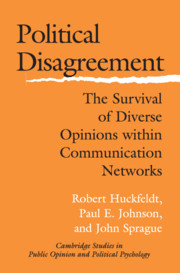Book contents
- Frontmatter
- Contents
- List of Figures
- List of Tables
- Acknowledgments
- 1 COMMUNICATION, INFLUENCE, AND THE CAPACITY OF CITIZENS TO DISAGREE
- 2 NEW INFORMATION, OLD INFORMATION, AND PERSISTENT DISAGREEMENT
- 3 DYADS, NETWORKS, AND AUTOREGRESSIVE INFLUENCE
- 4 DISAGREEMENT, HETEROGENEITY, AND THE EFFECTIVENESS OF POLITICAL COMMUNICATION
- 5 DISAGREEMENT, HETEROGENEITY, AND PERSUASION: HOW DOES DISAGREEMENT SURVIVE?
- 6 AGENT-BASED EXPLANATIONS, PATTERNS OF COMMUNICATION, AND THE INEVITABILITY OF HOMOGENEITY
- 7 AGENT-BASED EXPLANATIONS, AUTOREGRESSIVE INFLUENCE, AND THE SURVIVAL OF DISAGREEMENT
- 8 HETEROGENEOUS NETWORKS AND CITIZEN CAPACITY: DISAGREEMENT, AMBIVALENCE, AND ENGAGEMENT
- 9 SUMMARY, IMPLICATIONS, AND CONCLUSION
- APPENDIX A THE INDIANAPOLIS–ST. LOUIS STUDY
- APPENDIX B THE OPINION SIMULATION SOFTWARE
- References
- Index
3 - DYADS, NETWORKS, AND AUTOREGRESSIVE INFLUENCE
Published online by Cambridge University Press: 03 December 2009
- Frontmatter
- Contents
- List of Figures
- List of Tables
- Acknowledgments
- 1 COMMUNICATION, INFLUENCE, AND THE CAPACITY OF CITIZENS TO DISAGREE
- 2 NEW INFORMATION, OLD INFORMATION, AND PERSISTENT DISAGREEMENT
- 3 DYADS, NETWORKS, AND AUTOREGRESSIVE INFLUENCE
- 4 DISAGREEMENT, HETEROGENEITY, AND THE EFFECTIVENESS OF POLITICAL COMMUNICATION
- 5 DISAGREEMENT, HETEROGENEITY, AND PERSUASION: HOW DOES DISAGREEMENT SURVIVE?
- 6 AGENT-BASED EXPLANATIONS, PATTERNS OF COMMUNICATION, AND THE INEVITABILITY OF HOMOGENEITY
- 7 AGENT-BASED EXPLANATIONS, AUTOREGRESSIVE INFLUENCE, AND THE SURVIVAL OF DISAGREEMENT
- 8 HETEROGENEOUS NETWORKS AND CITIZEN CAPACITY: DISAGREEMENT, AMBIVALENCE, AND ENGAGEMENT
- 9 SUMMARY, IMPLICATIONS, AND CONCLUSION
- APPENDIX A THE INDIANAPOLIS–ST. LOUIS STUDY
- APPENDIX B THE OPINION SIMULATION SOFTWARE
- References
- Index
Summary
If political influence among citizens is autoregressive – if the political consequences of dyadic encounters depend on the distribution of preferences of citizens across the network – then we should expect to see distinctive patterns of agreement and disagreement. This chapter develops the autoregressive model of influence within a larger literature on the political consequences that arise due to networks and contexts. We then employ this general model to examine variations in patterns of disagreement and agreement within the self-defined communication networks of the respondents to the 2000 National Election Study.
Political influence is autoregressive within networks of communication if the influence due to a particular discussant's viewpoint depends on the distribution of political viewpoints among discussants in the remainder of the network. Hence, in an autoregressive model of influence, each of an individual's dyadic relationships is understood as being contingent on all the individual's other dyadic relationships. Autoregressive patterns of political influence produce distinctive patterns of agreement and disagreement within networks, and this makes it possible to evaluate whether influence is autoregressive by analyzing the distribution of agreement and disagreement within communication networks.
In the chapters that follow, we examine two separate mechanisms that generate these autoregressive patterns – the effects of preference distributions within networks on both the effectiveness as well as the persuasiveness of communication. Effectiveness is defined with respect to the clarity and accuracy of communication: Effectively communicated messages provide the recipients with clear, accurate, and unambiguous understandings of the senders' preferences and opinions.
- Type
- Chapter
- Information
- Political DisagreementThe Survival of Diverse Opinions within Communication Networks, pp. 46 - 67Publisher: Cambridge University PressPrint publication year: 2004



